A practice that I’ve begun following of late is incorporating the Michael Rood Chronological Gospels into my regimen of Torah Study. I do this following the Rood Astronomically & Agriculturally Corrected Biblical Hebrew Calendar and looking at the corresponding events based upon Rood’s presumed calendar dates. Those of you who haven’t and are so led, I would highly encourage you to get your hands on a copy of the Chronological Gospels and the Creator’s Calendar. These two tools work together to provide perspective in terms of the time frames that each Gospel event occurred. The time frames, of course, are highly connected and embedded in the Feasts of Yehovah, the Sabbath and Torah. Michael’s commentary on key events also illuminates the issues being addressed through the sighted events in the light of Torah, Judaism, history and the Hebrew language. This perspective has taken my study to a whole new level; beyond anything that I’ve ever experienced, just in the past year. I can’t recommend this invaluable tool enough.
Being transparent, I can’t say emphatically whether or not the events exactly correspond to every assigned date as Michael assigns in his Bible, but I truly believe at the very least, the dates and events as assigned are reasonable. I had the great privilege to speak to Michael last year, at an event launching the Chronological Gospels, regarding this very question about assigning dates and time frames. I expected Michael to provide me with some type of nebulous answer. However, I was highly impressed and surprised to learn from him that a great deal of research and study was placed in the assignment of dates/time frames to every event. In some cases, the events could be assigned to specific dates simply by correlating obviously-associated feasts and known documented history. Other, less than obvious events, required Michael to actually extrapolate distances and cultural practices in association with various historical markers–the biggest marker being the miraculous feeding of the 5,000, which Michael used as a primary reference point for much of the Chronological Gospels construction.
The most recent event correlation was 68–“Yeshua and His disciples ‘harvest, winnow, and grind’ grain on the second Sabbath after the first of the month, incurring the wrath of the Pharisees.” This event, as recorded in Matthews 12:1-8; Mark 2:23-28; and Luke 6:1-5, is believed to have occurred on the Shabbat, 10th day, of the 5th Biblical month which certain computers have been used to extrapolate back in time to specific dates, assigns this day to August, 2, 27 of the common era. This is a well-known story. Yeshua and His disciples happen to have been traversing a wheat field on the second Sabbath of the 5th Biblical month when certain religious leaders witness them plucking wheat and eating grains of wheat to cull their hunger. The religious leaders attributed the act of plucking wheat and extracting the kernels as violating Sabbath laws; specifically the Pharisees accused the group of conducting work on the Sabbath. Yeshua’s response to the accusation was one of outrage in that the violation of the Sabbath laws as seen by the Pharisees was in no way Torah-based. The fact of the matter was that the oral tradition in this and virtually every other commandment, law and precept of the Torah was refashioned by the religious leaders to create a form of righteousness that was not of Yehovah but of man. To get His point across, Yeshua referred the Prushim to the story of David while hiding from King Saul who sought to kill him, took Shewbread for him and his men from the tabernacle to eat (1 Samuel 21:14-16). The showbread, by Torah, was restricted to the consumption by the Tabernacles priests (Exodus 25:30 and Leviticus 24:5-9). The showbread was considered to be holy (Leviticus 24:9) and only to be eaten by Aaron and his sons. In general. The letter of Torah would indicate that consumption of the shewbread by anyone other than the Levitical priest was out of the question. Yet Yehovah never instructed that this was emphatically the case. Consequently, David, hiding from King Saul, hungry, and in need, found a source of provision through the grace and providence of Yehovah. If this David and the shewbread situation were to have been played out by the Prushim who rebuked Yeshua, likely David would have been sent away without sustenance and we can only surmise what would have become of him afterwards. Interestingly, the attending priest who provided the showbread to David, although having a degree of angst over the entire situation, capitulated and provided the bread to David with the understanding that David and his men were in a state of purity. Also interestingly, Yehovah, who enjoyed a close relationship with David, seemed to have not had any issue with David taking the shewbread for emergency sustenance.
Letter of the Law, without any consideration for the spirit of the Law, can be problematic, especially as it relates to our Hebraic Roots/Messianic Faith. I recall coming in to this Truth going on 10-years ago and having to work through the many challenges and questions regarding the Sabbath. The Torah is clear on there being no work conducted on the Sabbath. But the questions that floated around us constantly was, what constitutes work? Thus, we went through a million and one permutations and adjustments regarding the observance of Sabbath. In our home, we went from one extreme to the next because we didn’t fully grasp what the expectation was regarding the Sabbath and the whole concept of what we can and can’t do on the Sabbath. I’m certain that many of you have faced the same situation. I can tell you, this very situation had a tendency to create a lot of turmoil in our home during the early days of our transitioning to Sabbath observance. Very early on, we swung heavily over towards total, systematic, shutdown on the Sabbath. I mean, absolutely NO television watching allowed; no preparation of meals; prayer beginning at sundown and again at the end of Sabbath; no running of appliances; and there were other things implemented that escapes me at the moment. Well, the pendulum swung from extreme conservative to more liberal, especially after we affiliated with United Church of God and then Rock Valley Christian Church. Being in these fellowships, we experienced working hard to facilitate the conduction of weekly Sabbath services as well as eating out in restaurants and other peoples homes during the Sabbath. So, it was indeed interesting how things can change in terms of how we as humans apply Torah to our lives, especially as it relates to something as foundational as the Sabbath.
As it related to this particular event, the Torah by this point in history had become nothing more than a broken egg shell (my wording and description) whereby the whole egg (i.e., the Torah as given by Yehovah to the children of Israel) had been cracked open by men and the contents spilled out into a skillet. The purity of the egg was then comprised by the heat of the stove and the extra “stuff” (i.e., seasoning, butter, etc.) that is added to suit the taste of the one who is cooking it. The Law as known to the Jew in first century Palestine was not Torah. The original 613 laws, commandments and precepts that were stipulated in the five books of Torah had morphed into 1000’s of additional laws and rules, all designed according to the Prushim, to keep the Jew from violating the original 613 laws. This erecting of a fence around Torah by these man made laws (as it has come to be known in Judaism) was never intended nor sanctioned by Yehovah and it was this system of laws (i.e., the Talmud; takanots; ma’hasim) that enraged the Master and ultimately resulted in His crucifixion. The instance of Yeshua’s disciples plucking wheat and rubbing the kernels in their hands to strip away the chaff as they traversed that wheat field that August day in 27 C.E. was deemed a violation of the Law, when in fact it was only a violation of Jewish law. The Prushim’s interpretation of Torah through the lenses of Judaism regarding the Sabbath was in many cases absolutely ludicrous. Instead of a people (specifically Jews) experiencing freedom from sin through the keeping of Torah, the people instead experienced an intense form of bondage to religion. I recall reading something a few years ago that certain sects of Judaism weren’t allowed even to tear toilet paper to take care of their personal toilet needs on the Sabbath. Thus, the toilet paper had to be torn into prepared strips on Friday so as to not incur the work of tearing a piece of toilet paper on the Sabbath. I mean, how silly is this. One can only surmise that hasatan and his imps have over the centuries fallen over themselves laughing at the absurdity of some of these rules.
As it relates to us: the redeemed and elect of Yeshua HaMaschiach, our observance and keeping of Sabbath must be done within a healthy and proper perspective. Indeed, Torah is clear that we must not do any work. Most will agree that work would refer to servile activity–especially activity that we do on a daily basis to provide financial support for our families. This work would be considered income. But then, what about the work of cleaning up the house, mowing a lawn, washing clothes, preparing meals, baby sitting, and the like? I guess the best way to look at this is, there is absolutely no reason to do any of these tasks on the Sabbath when there are six other days in the week in which to complete this tasks. These tasks may not be activities for which we earn a living, but they could be classified as servile work. Then what about those who work in socially critical positions such as paramedics, firemen, policemen, doctors, nurses and soldiers–these professionals keep our society safe from the dangers of everyday life? Surely Yehovah would be okay if a believer who happens to be one of these critical professionals was required to fulfill the tenets of their profession (i.e., work) on the Sabbath. I think most would concede that the believer in Messiah is compelled to honor the Sabbath by not fulfilling the tenets of His profession on the Sabbath. I believe that it comes down to one who finds themselves in such a situation to petition Yehovah to provide the right organization that would grant him or her the Sabbath off. I found myself in a similar situation and it was the grace of Yehovah that worked a wonder and I was promoted to a position that did not require me to work on Sabbaths. Yehovah can do wonders if we seek Him and never doubt Him. It’s a trust issue. And if we aren’t able to make headway in the company or organization in which we are employed, then maybe Yehovah has another, even better, opportunity out there for us that does not require us to work on the Sabbath. Nevertheless, this is an individual issue that one must face alone and make the decision of what to do about the Sabbath. True believers must make a stand. However, true believers must keep Torah real and not fall pray to personal perceptions and ideals as to what constitutes proper Sabbath observance. The Torah is clear as to what justifies generally the proper observance of the Sabbath–that is there will be no work. The minute details, however, rests with the leading of the Holy Spirit and common sense. If you’re hungry on the Sabbath and your options are limited, by all means find something to eat. Next time, maybe you might want to be more prepared so as to not find yourself in the same situation. Just saying.




